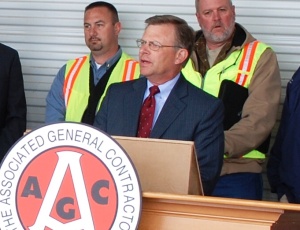The Associated General Contractors of America and the California Air Resources Board have reached an official agreement to postpone the beginning of compliance of the state�s off-road diesel emission rules until 2014.

In a joint announcement, Mary Nichols, CARB chairman, and Michael Kennedy, AGC�s general counsel, agreed that they would continue to work together to resolve the technical details attached with a complex set of regulations that CARB put into motion in 2007.
�Stretching out the timelines and reporting requirements will make the path to compliance a lot easier while the construction industry recovers from severe financial hardships,� says Nichols, who adds that the added time will allow the marketplace to �create a turnover� of old equipment.
The proposed changes will need approval from the CARB board at its next hearing on Dec. 16-17.
Kennedy adds that the proposed changes are based on new and far lower estimates of the emissions from the off-road diesel equipment in the construction industry. The association developed the new estimates earlier this year from its own study by Sierra Research, and over the summer the board staff largely confirmed them.
In CARB hearings over the last few months, board members have expressed concerns about the viability of the board�s data. �We are not in the business of attacking each other�s studies,� acknowledges Nichols.
�The new estimates provided a common starting point for changes that everyone agreed the data should drive,� Kennedy says.

NICHOLS
CARB says the newly proposed amendments would streamline the compliance process and offer businesses additional time and flexible options to meet requirements. They would also provide credits for efforts already made to reduce emissions, and incentivize continued early actions.
- If approved, the changes will:
� Delay start of requirements until Jan. 1, 2014
� Increase the number of �low-use� equipment exempted
� Provide simpler compliance options for the smallest fleets
� Extend benefits for businesses that comply before their deadline
� Lower annual requirements to clean up engines
First adopted in July 2007, the rule affects the state�s estimated 150,000 off-road vehicles used in construction, mining, airport ground support and other industries. It called for installation of diesel soot filters and the replacement of older, dirtier engines with newer emission-controlled models to curb diesel exhaust. Improvements were originally scheduled to begin in March 2010 for larger fleets, with medium and small-sized fleets having staggered implementation through 2015.
Other portions of the regulation that went into effect this year, including reporting, idling and equipment labeling requirements for all fleets, remain intact and are being enforced.
Though there have been reports of large numbers of unreported heavy-duty construction equipment operating (or not operating) in the state, Nichols says she thinks it is a �smaller number and we�ll continue to make efforts to indentify what�s out there.�
Regardless of the disagreements between AGC and the CARB, both officials acknowledged that they will work together in the future.
�It�s a win-win situation,� says Kennedy, who has long fought the implementation of the rules. �We will now work with the CARB in a serious way, sharing analysis and coming up with new emissions estimates. The industry will do its part to enhance the state�s air quality.�
�We applaud the AGC for showing leadership on this issue and recognizing that California needs to control all sources of diesel emissions,� adds Nichols.
Industry reaction to CARB�s decision was swift.
�These changes will go a long way in helping the construction industry and assist struggling construction companies with their bottom line,� says Tom Holsman, CEO of Associated General Contractors of California. �This has been a long process and is huge victory for both the industry and the state�s in addressing our air quality issues.�
�If the final agreement on the emissions is workable both for CARB and myself as a contractor, then these changes to the regulation will make it possible for us to maintain the financial strength we need in today�s market while maintaining the state�s air quality standards,� says Tom Foss, president and COO of Griffith Co. and member of the AGCC�s Diesel Emission Steering Committee.
Over the past several months, AGCC�s Diesel Emissions Steering Committee, led by Tom Brown of Sierra Pacific West, Inc., and AGC of America's general counsel Mike Kennedy, with AGC members John Daley, Daley Corp.; Tom Foss, Griffith Co.; Wayne Lindholm, Hensel Phelps; and Chris Hickey, William P. Young; provided data and information to CARB regarding their diesel emissions. This information helped establish the basis that CARB staff had over-estimated diesel emissions from off-road diesel equipment.
�When the California Air Resources Board first started to look at these issues more than five years ago, the American Rental Association was proactive and has worked with CARB staff members throughout the process,� says Christine Wehrman, ARA executive vice president and CEO. �All of our effort and determination has resulted in getting regulations that are fair for ARA members.� John McClelland, Ph.D, ARA�s vice president for government affairs, says ARA most recently focused on CARB�s model of how much fuel was used in off-road equipment to determine emissions.
�Our analysis was that the fuel use figures they used were four times greater than what we could verify using independent data sets, including data from the U.S. Energy Information Agency,� McClelland says. �A lot of evidence suggested they were over-estimating emissions from off-road equipment.� �We continued to work very diligently using data and scientific methods to show they were overestimating and the result has been that it appears that CARB staff members are now proposing a rule that eliminates the particulate matter requirements, which would have been the most difficult for rental companies to comply with,� he says.
McClelland adds that the ARA �made it clear that using their compliance model and using the rental fleet data we had, that someone with the cleanest fleet could have been unable to comply with the rule as implemented and forced to needlessly eliminate certain pieces of equipment from a rental fleet before normal attrition. That means a company would have had to take virtually new equipment and eliminate it from use. The rule was overkill and we convinced them that it was overkill.�

Post a comment to this article
Report Abusive Comment